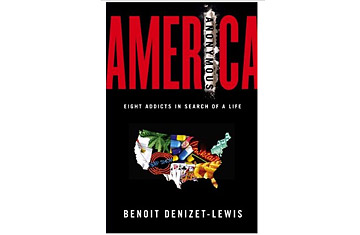
America Anonymous: Eight Addicts in Search of a Life
Benoit Denizet-Lewis
Simon & Schuster; 352 pages
The Gist:
Kate is a 32-year-old stay-at-home mom and shoplifter. Marvin is an 80-year-old alcoholic. Sean is a 20-year-old college student addicted to porn and hookers. And Todd? He's an addiction counselor who also happens to be hooked on booze, crack, gambling, cigarettes and heroin. Author Benoit Denizet-Lewis (who reveals his own long battle with sex addiction in the book) dives deep into the lives of these and four other average Americans who struggle with self-destructive urges. As Denizet-Lewis writes, "nearly 23 million Americans — 9.2 percent of the population twelve or older — are hooked on alcohol or drugs, another 61 million smoke cigarettes, and millions more are slaves to gambling, compulsive overeating, and sex and pornography." (See TIME's look at the state of American health.)
Highlight Reel:
1. On his favored definition of addiction, from a Sex and Love Addicts Anonymous pamphlet: "The use of a substance or activity, for the purpose of lessening pain or augmenting pleasure, by a person who has lost control over the rate, frequency, or duration of its use, and whose life has become progressively unmanageable as a result."
2. On the backward way in which America deals with addiction: "[Jody] takes a long drag from his cigarette. 'Man, we need accessible treatment,' he says. 'We need to have treatment centers like we have 7-Elevens. They need to be all over the f___ing place, and they need to be affordable. Treatment works. Maybe not the first time, but it works if you do it right, if you give it the time it needs. For that you need to f___ing fund it. But we don't do that. We'd rather build jails and spend millions of dollars cleaning up the messes of addicts, when we could spend much less and help them stop making messes!'"
3. On the guy who wrote that Oprah memoir that turned out to be full of lies: "As we drive through sleepy West Palm Beach, Jody can't stop talking about James Frey, the author of A Million Little Pieces. 'You wouldn't believe how much resistance I was getting from some families based on that book before Oprah finally laid the smack-down on him,' he tells me. 'I mean, what's the message of that book? The Twelve Steps are for p___ies. Fight everybody. Hold on. Get better on your own. Don't do anything the treatment center says. Get in a relationship right away. Go in the crack houses and save people. Basically all the messages that our addictions want us to believe so we stay addicted. If you know anything about addiction, you know that he's this typical, grandiose, un-recovered, wannabe bad-ass.'"
The Lowdown:
There's something ugly and fascinating about reading such intimate tales of debasement and depression and failure and self-doubt. Every addict in Denizet-Lewis' book speaks intelligently about his or her disease (this is to be expected; otherwise, there wouldn't be much of a book). They also all show a desire to do the years-long work in therapy and treatment and 12-stepping required — which is what makes their stories both heroic and at the same time kind of insufferable. The repetitive, self-obsessed language and terminology employed by any recovering addict is multiplied eightfold. While each of Denizet-Lewis' subjects have compelling enough tales of their own, the format that America Anonymous takes — cutting back and forth between stories — creates a numbing, circular feeling as many of the addicts go to treatment, relapse, self-flagellate, and then begin the process anew. If the author was purposefully trying to mimic the maddening cycle of addiction in the book's structure, he succeeded.
The good work here, however, is accomplished in Denizet-Lewis' attempt to expand the definition of addiction, to truly show it as the disease its victims see it to be rather than as a failing of morals or of willpower. Of course he's far from disinterested, as he uses part of the book to discuss his own addiction. Still, he ends on a thought-provoking note. Again, the words come from Jody, the afflicted, conflicted addiction counselor. "We don't have nearly enough people out there screaming until something changes, until we start devoting real money and resources to fighting this disease ... When will we wake up and flip the f___ing script?"
The Verdict: Skim
